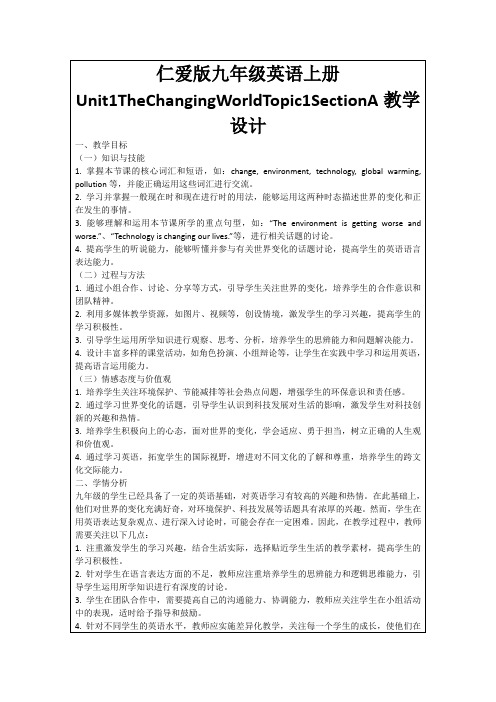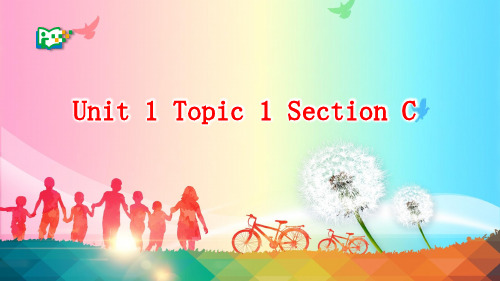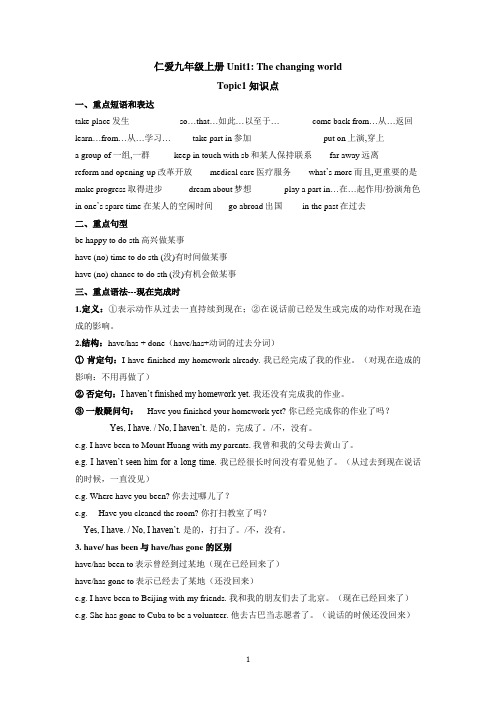九年级英语上册 Unit 1 The changing world.Topic 2 Which country has the largest population Section D
九年级英语上册Unit1TheChangingWorldTopic1知识点汇编仁爱版

九年级英语上册Unit1TheChangingWorldTopic1知识点汇编仁爱版一、重点词汇(一)词形转换1. training (动词) train“训练”2. whole (同音词) hole3. tidy (近义词) clean4. develop (名词) development(形容词)developed“发达的”; developing “发展中的”5. rapid (副词) rapidly6. old (比较级) older; elder7. recent (副词) recently8. narrow (反义词) wide 9. title (近义词) subject(二)重点短语1.have a good summer holiday 过一个愉快的暑假e back from…从……回来3.work for …为……工作4.feel sorry for…对……深表同情5. a disabled children’s home 一家残疾儿童养育院6.the whole holiday 整个假期7.tell stories to kids 给小孩讲故事8.learn…from 从……当中学习9.feed a child 喂小孩10.do farm work 干农活11.go to summer classes 上暑期班12.write an article about…写一篇有关……的文章13.have a hard/ happy life 过着艰苦的/ 幸福的生活14.in the past/ future 在过去/ 在将来15.in detail 详细地16.at sunrise 在日出时17.have no chance to do sth. 没有机会做某事18.afford ( to do) sth 担负得起(做)某事19.give support to sb. 给某人帮助/支持20.get a good education 获得良好的教育21.search…for…为了……搜索……22.have little food to eat 吃不饱23.dress warmly 穿得暖24.with the development of…随着……的发展25.have a balanced diet 饮食均衡26.play musical instruments 演奏乐器27.sleep in the open air 在户外睡觉28.study/ go abroad 在国外学习/ 出国29.enter/ win/ lose a competition 参加/ 赢得/ 输掉比赛30.enjoy Beijing Opera 欣赏京剧ed to do sth. 过去常做某事32.at sunrise 在日出时33.go hungry 变饿了34.fall ill 得病/ 患病35.divide …into…把……分成……36.feel satisfied with…对……感到满足37.see …. oneself 亲眼看见……38.make progress 取得进步39.thanks to 多亏; 幸亏;由于40.stand for 代表41.with the help of…在……的帮助下42.draw up an outline 拟定提纲三、重点句型1.You have just come back from your hometown. 你刚刚从你的家乡返回。
仁爱版九年级英语上册Unit1TheChangingWorldTopic1SectionA教学设计

(二)教学设想
1.创设情境:利用多媒体资源,展示世界变化的图片和视频,激发学生的学习兴趣,引导学生关注环境保护和科技进步。
2.互动式教学:通过小组合作、角色扮演等活动,让学生在实践中运用所学知识,提高语言表达能力。同时,教师应及时给予反馈和指导,帮助学生克服难点。
2.学生分享在本节课中的收获和感悟,以及在世界变化话题讨论中的体会。
3.教师强调情感态度与价值观的培养,鼓励学生在日常生活中关注环境保护,积极应对世界变化。
4.布置课后作业,要求学生运用所学知识,进行课后拓展,巩固学习成果。
五、作业布置
为了巩固本节课的学习成果,提高学生的英语综合运用能力,特布置以下作业:
1.教师设计丰富多样的练习题,如选择题、填空题、翻译题等,让学生巩固所学知识。
2.针对学生的不同水平,设计不同难度的练习题,使每个学生都能得到有效的训练。
3.教师及时批改并反馈练习结果,针对学生存在的问题,进行针对性的辅导。
(五)总结归纳
1.教师引导学生回顾本节课所学内容,总结词汇、语法、句型的重点和难点。
4.提高学生的听说能力,能够听懂并参与有关世界变化的话题讨论,提高学生的英语语言表达能力。
(二)过程与方法
1.通过小组合作、讨论、分享等方式,引导学生关注世界的变化,培养学生的合作意识和团队精神。
2.利用多媒体教学资源,如图片、视频等,创设情境,激发学生的学习兴趣,提高学生的学习积极性。
3.引导学生运所学知识进行观察、思考、分析,培养学生的思辨能力和问题解决能力。
5.完成课后练习册中与本节课相关的练习题,巩固词汇和语法知识。
6.学生自主收集关于世界变化的英文新闻或文章,进行阅读分析,并摘录其中的精彩句子和表达,以拓宽自己的知识面。
仁爱版英语九年级上册Unit1TheChangingWorldTopic1SectionD教学设计

5.阅读指导:通过阅读文章,培养学生关注文章主旨和细节的能力。采用问题导向法,设计有针对性的问题,引导学生深入思考,提高阅读理解能力。
6.情感教育:结合本章节主题,开展课堂讨论,引导学生关注世界变化、科技发展和环境保护等问题。同时,通过分享典型事例,激发学生的责任感,培养他们的情感态度和价值观。
7.课后拓展:鼓励学生在课后进行自主学习,关注时事新闻,拓宽知识视野。同时,布置相关作业,巩固所学知识,提高学生的学习效果。
8.评价与反馈:采用多元化的评价方式,如小组互评、教师评价等,关注学生的学习过程和成果。及时给予学生反馈,鼓励他们不断进步。
四、教学内容与过程
(一)导入新课
1.教师通过展示一组描绘世界变化、科技发展和环境保护的图片,引导学生观察并思考:“What is happening in our world?”、“How do you feel about these changes?”等问题。
4.提高学生的听说能力,通过听力练习和口语交流,让学生能够理解并表达关于世界变化、科技发展和环境保护等方面的信息。
5.培养学生的阅读理解能力,通过阅读文章,提取关键信息,理解文章主旨,并学会使用文章中的有用表达。
(二)过程与方法
在本章节的教学过程中,教师将采用以下方法引导学生学习:
1.情境教学法:通过展示图片、视频等教学资源,创设生动、真实的语境,让学生在情境中感知、体验和学习英语。
2.讲解一般现在时、一般过去时和一般将来时三种时态,结合实际语境,让学生在实际运用中掌握语法知识。
3.教师呈现Section D中的重点句型,如:“The world is changing rapidly.”、“We should protect the environment.”等,引导学生学会使用这些句型进行主题相关的讨论。
九年级英语上册 Unit 1 The Changing World Topic 1 Our coun

1. The main idea
What’s the main idea of the passage? A. Fuling is a beautiful city in Chongqing. B. Fuling has developed rapidly. C. Some information about old Fuling.
“KCeoempminuntoicuacthio”nms”emanesa_n_s__A_B_.__. AA. .thwerictoeuorrsephoof nimeporfotevning B.B.whaaypspoefnsqeunidciknlgy information
Tips 1: It’s utseelfeuglratmo gueCsosmtmheunmiceaatinoinnsg—s of the new words and thesipmhprlaes,esslobwy pictures
live _li_v_e_d_ ___li_v_e_d_
get __g__o_t _ ___g_o_t__
keep _k_e_p_t_ ___k_e_p_t _ make _m__a_d_e_ ___m_a_d_e_
interview _i_n_te_r_v_i_e_w_e_d_ _i_n_te_r_v_ie_w__e_d_
Have you found the difference?
narrow
Ring roads---wide
=not wide
telegram Communications— simple, slow
The communications were simple and slow, people kept in touch with their friends far away mainly by letter and telegram.
九年级英语上册unit1thechangingworld1_00001

Australia Africa
the Great Wall Hangzhou 第十页,共二十一页。
London America
Listen to 1a and complete the table.
Name Rita Jane
Mount
Place India Huang
Kangkang Maria
A: Where has Jane gone? I can’t find her.
B: She has gone to the
library.
第七页,共二十一页。
A: Where have Maria and her mother gone? I can’t find them.
B: They have gone to the
3. Some sentences:
There goes the bell. 4. The Present Perfect Tense
summary
We can:
1.Tell the differences between have/has gone to and have/has been to.
and she will be back ___________
tomorrow
1c Retell the main information of 1a based on 1b.
第十二页,共二十一页。
Key phrases and expressions:
1. 你的旅行如何? ____H__o_w__w_a_s__y_o_u_r_trip?
B
B. so...that C. very ... that D. too...to
仁爱版初中英语九年级上册unit 1 the changing world知识点归纳

仁爱九年级上册Unit1: The changing worldTopic1 知识点一、重点短语和表达take place发生 so…that…如此…以至于… come back from…从…返回learn…from…从…学习… take part in参加 put on上演,穿上a group of一组,一群 keep in touch with sb和某人保持联系 far away远离reform and opening-up改革开放 medical care医疗服务 what’s more而且,更重要的是make progress取得进步 dream about梦想 play a part in…在…起作用/扮演角色in one’s spare time在某人的空闲时间 go abroad出国 in the past在过去二、重点句型be happy to do sth高兴做某事have (no) time to do sth (没)有时间做某事have (no) chance to do sth (没)有机会做某事三、重点语法---现在完成时1.定义:①表示动作从过去一直持续到现在;②在说话前已经发生或完成的动作对现在造成的影响。
2.结构:have/has + done(have/has+动词的过去分词)①肯定句:I have finished my homework already. 我已经完成了我的作业。
(对现在造成的影响:不用再做了)②否定句:I haven’t finished my homework yet. 我还没有完成我的作业。
③一般疑问句:---Have you finished your homework yet? 你已经完成你的作业了吗?---Yes, I have. / No, I haven’t. 是的,完成了。
/不,没有。
e.g. I have been to Mount Huang with my parents. 我曾和我的父母去黄山了。
九年级英语上册Unit1TheChangingWorldTopic1Ourcountryhasdev
KaEnxagmkaplneg: hasMbaRJeareiintanaehthoaaasssabngbeoeeEnennentgotliosMhCIonsudunbimata.H.muearnsgc.hool.
Cuba
Rita has been to India. Jane has been to Mout Huang. Kangkang has been to an English sunmmer school.
Kangka ng
aCnubEa nglish ______ school
Maria
has gone _____ to be a to volunteer
herh_om__et_o_w_n___ has become morbeeaauntidful more _________ it is beaupetiofupllebut there were too many __im_p_r_o_ve_
They were back.
Maria has gone to Cuba. She didn't come back.
have/has gone to ... 去了某 地(未回来)
Michael: Hi, Maria, long time no see. Where __h_a_v_e_ you _b_e_e_n__?
B 4. He got up ______ late ______ he was late for work today.
A. such...as
B. so...that
C. very... that D. too...to
See you!
A. have taken place B. take place C. have happened D. happened
九年级英语上册 Unit 1 The Changing World Topic 1 Our coun
Homework
1. Read 1a aloud.
2. Make sentences with have/has gone to... and have/has been to... 3. Finish Section A in your workbook. 4. Preview Section B.
Jane
Kangkang
Maria
and she will be back tomorrow ___________
1c Retell the main information of 1a based on 1b.
Key phrases and expressions:
How was your trip? 1. 你的旅行如何? _________________
THANK YOU!
A. has been to
C. have been to
B. has gone to
D. goes to
A 2. Great changes ______ in my hometown.
A. have taken place
C. have happened
B. take place
D. happened
1b Listen to 1a and complete the table.
places near many _______ India the home in ______ Mount ________ Huang has been to with her _________ parents summer an English _______ school Cuba to be a ______ has gone to volunteer
九年级英语上册Unit1TheChangingWorldTopic1OurcountryhasdevelopedrapidlySectionC课件1(新版)仁爱版
Paragraph 2. In the 1960s, the living
conditions in the city were poor.
Paragraph 3. China has developed rapidly since
the reform and opening-up.
Underline the topiTcopisc esennttenecnescaere of each paragraph. usually at the beginning or
the ending of a paragraph.
Paragraph 1. She has seen the changes in
She has seen the changes in Beijing herself.
Complete the sentences with the correct forms of the given words.
1. Don’t worry about Jack. He is old enough to look after h_i_m_s_e_lf_ (he).
Paragraph 4. It is important to remember the
past, live in the present and dream about the future.
Task 2 Class work
Read for details
Paragraph 1
Topic sentence:
Read and fill in the blanks.
In the 1960s, the living conditions in the city were ______. pTohoerroads were narrow and there weren’t many ______ roads. Big rfianmgilies were _________ into small hcoruoswesd.eMd any families couldn’t get enough food. Few children had the ________ to receive a good education. Pcehoapnlcee______ little money to see a doctor. And there wheared _______ hospitals. People kept in touch ______ their frfieenwds and relatives far away mainly by lettwerithor telegram.
九年级英语上册 Unit 1 The Changing World Topic 1 Our coun
Unit 1 Topic 1 单词解析1. afford(1) afford表示“(有足够的金钱、时间)做某事,买得起、负担得起”等。
afford后面常接动词不定式。
它通常与can, could, be able to等连用表示“有时间、金钱等条件来做某事”。
afford用于否定句、疑问句中,表示“为(某目的)有足够的钱、时间等”。
如:His family was too poor to afford his college education. 他家太穷了,支付不起他的大学教育。
(2) afford 表示“提供、给予、买得起”等。
如:Watching TV affords pleasure. 看电视给人带来快乐。
注意: afford 与provide都意为“供给”。
afford指“为一定的目的而提供所需要的东西”。
provide主要指“为某人、某物供应某物品(特别是指生活必需品)”。
2. consider(1) consider 用作动词,意为“考虑”,相当于think about,后接名词、代词、V-ing形式、从句或“疑问词 + 不定式”作宾语。
但其后不能直接跟动词不定式作宾语。
如:He has never considered how to solve the problem. 他从未考虑过如何解决那个问题。
(2) consider还有“认为”的意思,相当于think,后接复合宾语或从句。
如:We consider that the song is worth listening to. 我们认为这首歌曲值得一听。
(3) consider ... as ... 中的as是介词,后接名词、形容词或V-ing形式作补足语。
consider ... as 相当于regard ... as(把……看作,把……视为),常用于被动语态中。
如:I consid er him as my best friend. 我把他看成我最好的朋友。
- 1、下载文档前请自行甄别文档内容的完整性,平台不提供额外的编辑、内容补充、找答案等附加服务。
- 2、"仅部分预览"的文档,不可在线预览部分如存在完整性等问题,可反馈申请退款(可完整预览的文档不适用该条件!)。
- 3、如文档侵犯您的权益,请联系客服反馈,我们会尽快为您处理(人工客服工作时间:9:00-18:30)。
Unit 1 The changing world.Topic 2 Which country has the largest
population Section D
【学习明确】
1.复习巩固现在完成时;
2.了解中国和加拿大不同的城镇生活;
3.谈论不同的家庭类型,并了解不同类型家庭的利弊所在。
【预习案】
一、读1a,根据短文内容完成1b关于Fairmont和北京两个城市的图表
二、在文中找到并划出下面的短语
1.不到600人_______________
2.互相帮助________________
3.过得开心___________ 4 .for a couple of hours________________
5.住得很远_____________________
6.中国的首都_______________________
7.一段悠久的历史_______________ 8.很多名胜古迹_____________________
9.长城_________________ 10.十三陵_______________
11.颐和园_____________________ 12.故宫_______________________
13.公共交通________________________14.跟上,赶上______________________
15.belong to…______________________16.extende d family___________________
17.nuclear family_____________________18.three types of families_________
【探究案】在文中划出下面的句子并分析
1.I live in a small mountain town called Fairmont. 译:
__________________________________________________
点拨:called Fair mont --- 过去分词短语作后置定语,还可以替换为:
named / with the name of
练习:那个名叫Jim的男孩是我弟弟。
The boy _______ _________ is my brother.
2.I can’t go shopping in big stores unless I travel for a couple of hours. 译:___________________________________
点拨:unless = if … not 同义句转换:
_______________________________________________________________
练习:You won’t feel happy at school unless you get on well with your classmates. 点拨:a couple of…= a few, several --- 一些,几个(修饰可数名词)
拓展:a couple of…--- 一对儿,夫妇(多用来指人和动物) 区别:a pair of…---一对儿(多用来指不能分开的物品)
练习:a couple of apples_____________ a couple of dogs______________
a young couple______________________ a pair of sunglasses____________
a pair of new shoes_______________ in pairs / in couples_______________
3.People have to study and work hard to keep up with the quick development of modern society.
点拨:keep up with ---(保持)跟上,赶上
区别:catch up with --- (从落后到)跟上,赶上思考:come up with
【归纳】
写出下面动词的过去式---过去分词
catch---_________---__________ choose---________---__________ come---___________---__________ cost---___________---__________ cut---________---__________ deal---_________---__________ dig---___________---__________ do---__________---__________ draw---_________---__________ dream---_________---__________ drink---_________---__________ drive---_________---__________ eat---__________---___________ fall---_________---__________ feed---__________---___________。
